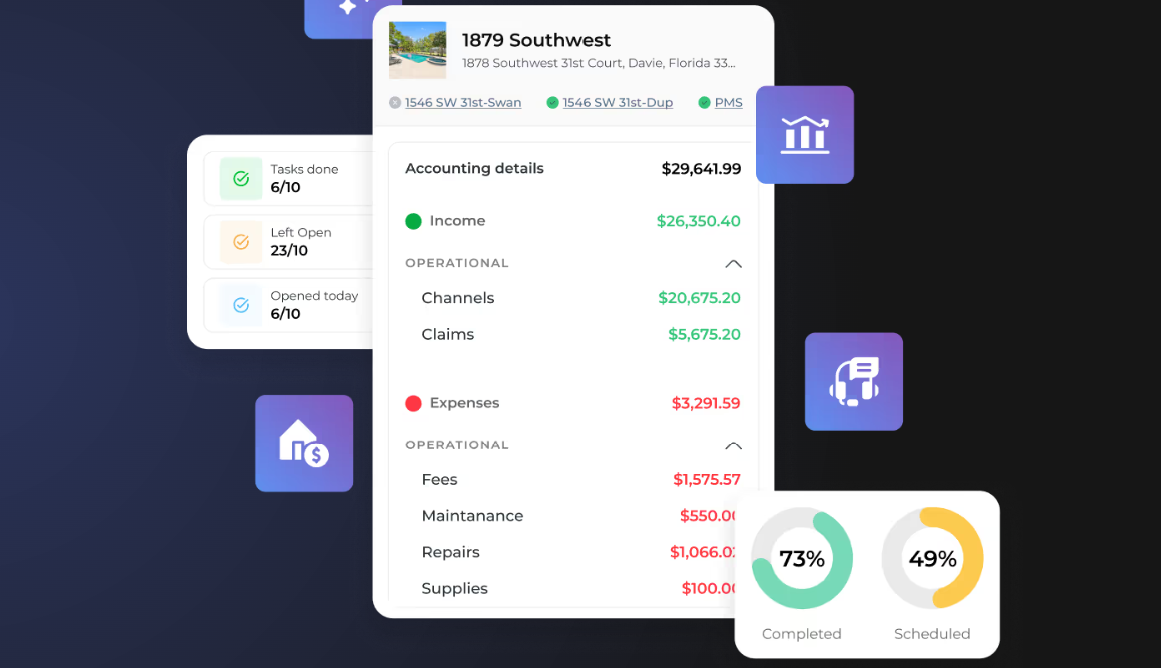By Justin Stone, HTN staff writer – 10.8.2025
Boom, positioning itself as the world’s first AI-powered property management system (AiPMS), has closed a $12.7 million funding round led by Avenue Growth Partners. The new capital will fuel expansion into additional markets, hiring across engineering, data science, and customer success, and the continued advancement of agentic AI designed for short-term rental (STR) and hospitality operations.
The round also drew support from prominent industry figures, including Ian Carter, former CEO of Hilton International; Scott Srebnick, CEO of Goldman Properties; and Gary Fatakov, Co-Founder of Siemplify, which was acquired by Google in 2022. These investors had previously backed Boom and are now deepening their commitment as the company scales. With this infusion of funding, Boom plans to reinforce its global footprint and push the boundaries of AI automation in hospitality management.
Boom’s AiPMS platform places artificial intelligence at the very core of hospitality operations. Its technology automates a wide range of tasks, from guest communications and review management to maintenance scheduling, operational workflows, and financial reconciliation. According to the Miami-based company, Boom’s AI now handles approximately 80 percent of guest messages and inquiries, significantly reducing manual workload while improving response times. For property managers and operators worldwide, the results have been tangible: higher conversion rates, increased revenues, and more time for relationship-building and business growth.
The platform also provides full visibility into financial and operational performance, replacing the patchwork of disconnected systems that property managers have long relied upon. By centralizing data and surfacing actionable insights, Boom enables faster, clearer, and more data-driven decision-making. Its strong global traction—spanning 20 countries across five continents—and an NPS score of 86, more than double the SaaS industry average, demonstrate both trust and satisfaction among its users.
The timing of this raise reflects a broader transformation underway in the STR and hospitality sectors. Artificial intelligence, once viewed as a futuristic concept, is now integral to daily operations across the industry. Chat assistants, automated pricing engines, and smart home integrations have rapidly moved from experimental tools to essential capabilities. As adoption accelerates, attention is shifting to “agentic AI”—systems that not only analyze and recommend but can act autonomously to execute tasks, decisions, and optimizations.
According to McKinsey and Skift’s recent report Remapping Travel with Agentic AI, the hospitality sector is entering a new era where autonomous agents are beginning to take over complex, multi-step processes. Scaling those capabilities, however, will require new frameworks for governance, model training, and data reliability. Boom is positioning itself squarely at the center of this transformation.
“Our mission is to take the heavy lifting out of property management so operators can deliver better guest experiences and build stronger businesses,” said Shahar Goldboim, Boom’s CEO and Founder. “With an NPS of 86, our customers’ trust speaks louder than anything—and this funding allows us to keep earning that trust while supporting it with scale. Our agentic AI modules are already driving results today, and this raise will help us scale that impact—improving guest satisfaction, increasing profitability for managers, and giving them a better work-life balance.”
Boom’s funding comes as competition intensifies among hospitality technology providers racing to infuse AI deeper into their platforms. MRI Software, for instance, has launched AI agents and embedded assistants for its property and commercial real estate systems, while AppFolio continues to expand its use of predictive models and process automation for large property portfolios. Other players like Stan AI, Domos, and Beam AI are pursuing narrower applications such as automating maintenance or streamlining guest communications. Yet Boom’s strength lies in its vertical focus: a hospitality-native AI layer that unifies operations across communications, task management, and finance—purpose-built for hotels and STR operators rather than adapted from general property management tools.
Still, challenges loom. True agentic autonomy requires balancing independence with human oversight, ensuring accuracy and accountability when algorithms make operational decisions. Success also depends on the quality of data feeding those systems—an area where legacy operators often struggle due to fragmented infrastructure. Scaling internationally brings added complexity, as hospitality regulations, tax structures, and guest expectations differ by region. And while automation promises efficiency, the hospitality industry must remain careful not to sacrifice the human touch that defines great service.
Boom’s next phase will test whether its AI-native design can deliver on its ambitious promise of intelligent autonomy without losing that balance. If it succeeds, the company may not just compete with legacy players—it could redefine how hospitality operations are run, moving managers from reactive firefighting to proactive business optimization.
For now, one thing is clear: in the emerging race toward agentic AI, Boom’s latest funding gives it both the capital and the credibility to lead. The company’s ability to demonstrate real-world results at scale—while preserving trust and accountability—will determine whether it becomes the category-defining standard for the next generation of property management systems.







